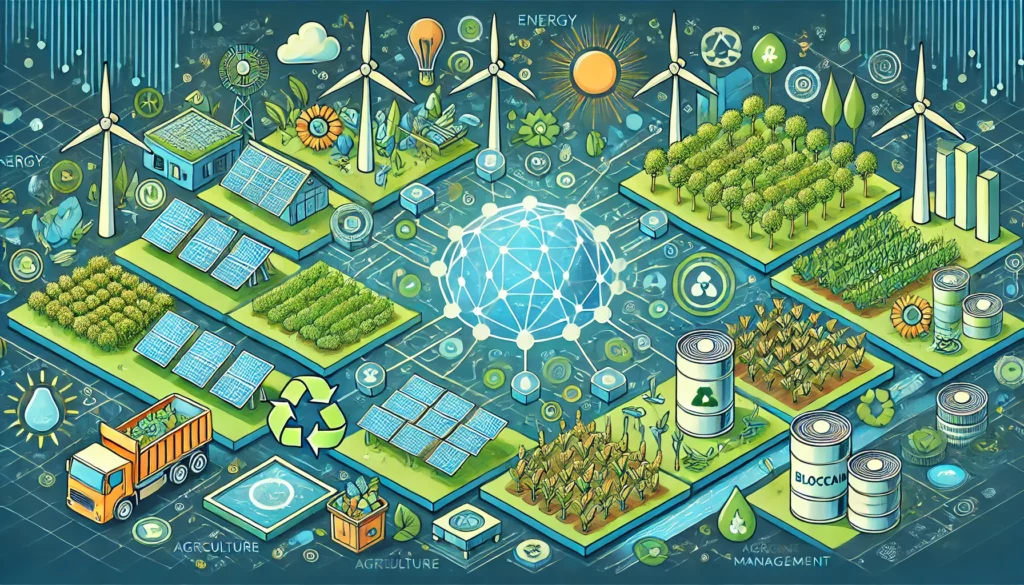Sustainable development is one of the most pressing challenges of our time, requiring innovative solutions to balance economic growth, environmental preservation, and social equity. Blockchain technology, best known for powering cryptocurrencies, is emerging as a powerful tool to drive sustainability across various sectors. By enabling transparency, efficiency, and accountability, blockchain is transforming critical areas like energy, agriculture, and waste management, making them more sustainable and resilient.
This article explores the transformative role of blockchain in promoting sustainable development and highlights real-world applications that are driving positive change.
1. Blockchain in Renewable Energy
1.1 Decentralized Energy Grids
Blockchain is revolutionizing the energy sector by enabling decentralized peer-to-peer (P2P) energy trading. Traditional energy grids often suffer from inefficiencies and high costs due to centralized control. Blockchain creates transparent and tamper-proof systems where individuals and businesses can trade excess energy directly with one another.
- Example: Platforms like Power Ledger and Grid+ allow households with solar panels to sell surplus energy to neighbors, promoting the adoption of renewable energy.
1.2 Energy Certificates and Carbon Credits
Blockchain simplifies the tracking and trading of renewable energy certificates (RECs) and carbon credits. By creating a transparent digital ledger, it ensures the legitimacy of these credits and reduces the risk of fraud.
- Impact: Companies can verify their renewable energy consumption and carbon offsets in real time, enhancing accountability and driving investments in green initiatives.
1.3 Smart Grid Management
Blockchain integrates with the Internet of Things (IoT) to manage smart grids efficiently. Sensors collect data on energy production and consumption, while blockchain records and automates transactions, optimizing resource allocation.
2. Blockchain in Agriculture
2.1 Supply Chain Transparency
Agriculture supply chains are often opaque, making it difficult to trace the origin and quality of food products. Blockchain provides an immutable record of every step in the supply chain, from farm to fork.
- Example: Companies like IBM Food Trust use blockchain to track crops, ensuring consumers can verify that their food is ethically sourced and sustainably grown.
2.2 Reducing Food Waste
Blockchain helps monitor the freshness of perishable goods throughout the supply chain, enabling better inventory management and reducing food waste.
- Impact: By identifying inefficiencies and delays, stakeholders can take proactive measures to minimize spoilage and ensure timely delivery.
2.3 Fair Trade and Farmer Empowerment
Blockchain ensures fair compensation for farmers by providing transparent records of transactions. It eliminates middlemen, ensuring that producers receive a fair share of the profits.
- Example: Platforms like AgriLedger empower farmers in developing countries by facilitating direct trade with buyers, enhancing trust and equity.
2.4 Precision Agriculture
Blockchain integrates with IoT and AI to enable precision farming. Sensors collect data on soil health, weather conditions, and crop performance, while blockchain records and analyzes the data for better decision-making.
3. Blockchain in Waste Management
3.1 Waste Tracking and Recycling
Blockchain enables transparent tracking of waste, from collection to disposal. It ensures that recyclable materials are properly segregated and prevents illegal dumping.
- Example: Projects like Plastic Bank use blockchain to incentivize recycling by rewarding individuals with tokens for collecting plastic waste, which is then recycled or repurposed.
3.2 Circular Economy
Blockchain supports the circular economy by creating digital records for products and materials. It tracks their lifecycle, ensuring that they can be reused, repaired, or recycled rather than discarded.
- Impact: Manufacturers and consumers can make informed choices, reducing waste and promoting sustainability.
3.3 Transparent E-Waste Management
Electronic waste (e-waste) is one of the fastest-growing waste streams globally. Blockchain provides end-to-end tracking of e-waste recycling processes, ensuring compliance with environmental regulations.
4. Benefits of Blockchain in Sustainable Development
Blockchain’s unique attributes make it a powerful tool for advancing sustainability goals:
4.1 Transparency
Blockchain’s immutable ledger ensures that all transactions and records are transparent and verifiable, building trust among stakeholders.
4.2 Efficiency
By automating processes through smart contracts, blockchain reduces administrative overheads and streamlines operations in energy, agriculture, and waste management.
4.3 Accountability
Blockchain holds all participants accountable by providing a clear record of actions, reducing fraud and unethical practices.
4.4 Scalability
Blockchain networks can scale to manage complex ecosystems, making them suitable for large-scale sustainable development initiatives.
5. Challenges to Overcome
While blockchain holds immense potential, challenges remain:
5.1 High Energy Consumption
Ironically, blockchain itself can be energy-intensive, especially networks using Proof of Work (PoW) consensus mechanisms. Transitioning to energy-efficient models like Proof of Stake (PoS) is critical.
5.2 Integration with Legacy Systems
Many industries still rely on outdated systems that are difficult to integrate with blockchain, requiring significant investment in infrastructure and training.
5.3 Regulatory Barriers
The lack of standardized regulations around blockchain technology creates uncertainty and slows adoption.
5.4 Data Accuracy
Blockchain is only as reliable as the data entered into it. Ensuring accurate and reliable data input is essential for its effectiveness.
6. The Future of Blockchain in Sustainability
As blockchain technology evolves, its role in sustainable development is expected to expand. Key trends to watch include:
- Collaboration Between Industries: Partnerships across energy, agriculture, and waste management will drive innovation and create holistic solutions.
- Integration with AI and IoT: Combining blockchain with AI and IoT will enhance data collection, analysis, and decision-making for sustainability initiatives.
- Global Standards: The development of international regulatory frameworks will promote wider adoption and interoperability of blockchain solutions.
- Public Awareness and Education: Increased awareness of blockchain’s potential can drive investment and innovation in sustainable projects.
Final Thoughts
Blockchain technology is proving to be a game-changer in the pursuit of sustainable development. Its ability to bring transparency, efficiency, and accountability to complex systems makes it an invaluable tool for addressing global challenges in energy, agriculture, and waste management. While hurdles like energy consumption and regulatory barriers must be addressed, the potential for blockchain to drive meaningful change is undeniable.
As the world seeks innovative ways to balance economic growth with environmental stewardship, blockchain stands out as a powerful ally in building a more sustainable future. Its adoption across industries not only accelerates the transition to greener practices but also empowers individuals and communities to participate in shaping a better world.


